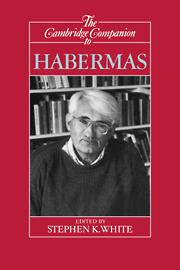11 - Habermas's significant other
from PART V - THE DEFENSE OF MODERNITY
Published online by Cambridge University Press: 28 May 2006
Summary
In the profane understanding, anyone who is also interested in the latest German writing is a Kantian. In the scholarly understanding, a Kantian is only he who believes that Kant is the truth and that, if the mail coach from Konigsberg were ever to have an accident one might well find oneself without the truth for some weeks.
F. Schlegel, Athenaeum, Fragment 104We have to stand by our traditions . . . if we do not want to disavow ourselves.
Jürgen Habermas, “On the Public Use of History”If in what follows we appear critical, it is not because we are unappreciative of the real achievement of the work of Jürgen Habermas. The theory of communicative action makes the case that rationality is a relevant moral social concept. That humans speak with and to each other places them, he shows, in a moral relationship, simply by the actuality of the fact of that speech. Habermas develops this position into a critical defense of modernity around a vision of the “formation of autonomous public spheres, which . . . enter into communication with one another as soon as the potential for selforganization and the self-organized employment of communication media is made use of.” This is a democratic picture based upon the potential egalitarianism of uncoerced participation in discourse.
- Type
- Chapter
- Information
- The Cambridge Companion to Habermas , pp. 263 - 288Publisher: Cambridge University PressPrint publication year: 1995
- 7
- Cited by



